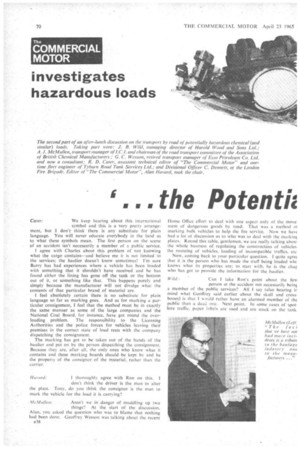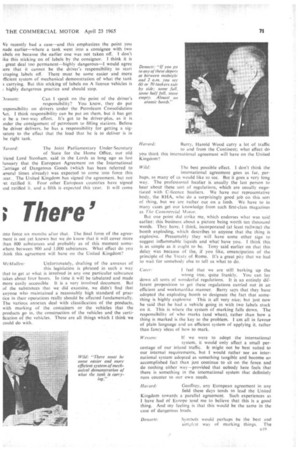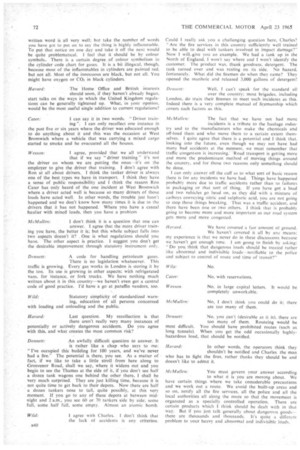. the Potentii ; There'
Page 72

Page 73

Page 74

If you've noticed an error in this article please click here to report it so we can fix it.
Cater: We keep hearing about this international symbol and this is a very pretty arrangement, but I don'tthink there is any substitute for plain language. You will never educate everybody in the land as to what these symbols mean. The first person on the scene of an accident isn't necessarily a member of a public service.
I agree with Charles about this problem of not knowing what the cargo contains—and believe me it is not limited to the services; the haulier doesn't know sometimes! I'm sure Barry has had experiences where a vehicle has been loaded with something that it shouldn't have received and he has found either the lining has gone off the tank or the bottom out of it, or something like that. This happens purely and simply because the manufacturer will not divulge what the contents of that particular brand of material are.
I feel absolutely certain there is no substitute for plain language so far as marking goes. And as for marking a particular consignment, I feel that the method must be in exactly the same manner as some of the large companies and the National Coal Board, for instance, have got round the overloading problem. The responsibility to the Licensing Authorities and the police forces for vehicles leaving their premises in the correct state of load rests with the company dispatching the consignment.
The marking has got to be taken out of the hands of the haulier and put on by the person dispatching the consignment. Because they are, after all, the only ones who know what it contains and these marking boards should be kept by and be the property of the consignor of the material, rather than the carrier.
Harard: I thoroughly agree with Ron on this. I
don't think the driver is the man to alter the plate. Tony, do you think the consignor is the man to mark the vehicle for the load it is carrying?
McMullen: Aren't we in danger of muddling up two
things? At the start of the discussion, Alan, you asked the question who was to blame that nothing had been done. Geoffrey Wesson was talking about the recent 1338 Home Office effort to deal with one aspect only of the move merit of dangerous goods by road. That was a method 01 marking hulk vehicles to help the fire service. Now we havt had a lot of discussion as to who was to deal with the markint plates. Round this table, gentlemen, we are really talking abotr the whole business of regulating the construction of vehicles the routeing of vehicles, loading of incompatible traffics. etc Now, coming back to your particular question. I quite agret that it is the person who has made the stuff being loaded whr knows what its properties are; to start with, he is the char who has got to provide the information for the haulier.
Wild:Can I take Ron's point about the firsi
person at the accident not necessarily beinr a member of the public services? All I say (also bearing ir mind what Geoffrey said earlier about the skull and crossbones) is that 1 v,ould rather have an alarmed member of thc public than a dead one. Next point. In some cases of spothire traffic, paper 1;theis are used and are stuck on the tank Ve recently had a case—and this emphasizes the point you aade earlier—where a tank went into a consignee with two abets on because the earlier one was not taken off. I don't ike this sticking on of labels by the consignor. I think it is
great deal too permanent—highly dangerous—I would agree iere that it cannot be the driver's responsibility to start craping labels off. There must be some easier and more ,fficient system of mechanical demonstration of what the tank s carrying_ But this sticking of labels on A licence vehicles is L highly dangerous practice and should stop.
3ennett: Can I speak on the point of the driver's
responsibility? You know, they do put esponsibility on drivers under the Petroleum Consolidation ket. I think responsibility can be put on them, but it has got o be a two-way effort Its got to be driver-plus, as it is inder the consignment of petroleum to filling stations. Before he driver delivers, he has a responsibility for getting a sigtature to the effect that the load that he is to deliver is in he right tank.
Vavard: The joint Parliamentary Under-Secretary of State for the Home Office, our old riend Lord Stonham. said in the Lords as long ago as last lanuarythat the European Agreement on the International 2arriage of Dangerous Goods (which has been referred to ;everal times already) was expected to come into force this (ear._ The United Kingdom has signed the agreement, but not ret ratified it. Four other European countries have signed tnd ratified it, and a fifth is expected this year. It will come
[nto force six months after that. The final form of the agreement is not yet known but we do know that it will cover more fian 800 substances and probably as of this moment somewhere between 900 and 1,000 substances. What effect do you think this agreement will have on the United Kingdom?
WO idler': Unfortunately, drafting of the annexes of
this legislation is phrased in such a way that to get at what is involved in any one particular substance takes about four hours. In time it will be tabulated and made more easily accessible It is a very involved document. But of the substances that we did examine, we didn't find that anyone who maintained a reasonably high standard of practice in their operations really should be affected fundamentally. The various annexes deal with classification of the products, With marking of the containers or the vehicles that the products go in, the construction of the vehicles and the certification of the vehicles. These are all things which I think we could do with.
Havard: Barry, Harold Wood carry a lot of traffic
to and from the Continent; what effect do you think this international agreement will have on the United Kingdom?
Wild: The best possible effect. I don't think the international agreement goes as far, perhaps, as many of us would like to see. But it goes a very long way. The professional haulier is usually the last person to hear about these sort of regulations, which are usually negotiated with C-licence hauliers. We have our representative body, the KHA, who do a surprisingly good job on this sort of thing, but we arc rather out on a limb. We have to in many cases get our knowledge from such first-class magazines as The Commercial
But one point did strike me, which endorses what was said earlier: this business about a picture being worth ten thousand words. They have, I think, incorporated (at least railwise) the bomb exploding, which describes to anyone that the thing is explosive. Presumably they will have some other sign to suggest inflammable liquids and whar have you. I think this is as simple as it ought to be. Tony said earlier on that this delay was because of the, if you like, emancipation of the principle of the Treaty of Rome. It's a great pity that we had to wait for somebody else to tell us what to do.
I feel that we are still barking up the
wrong tree, quite frankly. You can lay down all sorts of wonderful regulations. It is an entirely different proposition 10 get these regulations carried out in an efficient and workmanlike manner. Barry says that they have adopted the exploding bomb to designate the fact that something is highly explosive This is all very nice; but just now he said that he had a vehicle going in with two labels stuck on it. This is where the system of marking falls down. The responsibility of who marks (and when), rather than how a thing is marked is the key to the problem. I am all in favour of plain language and an efficient system of applying it, rather than fancy ideas of how to mark.
Wesson: If we were to adopt the international system, it would only affect a small percentage of our inland traffic. It might not be best suited to our internal requirements, but I would rather see an international system adopted as something tangible and become an accomplished fact than just continue to sit on the fence and do nothing either way—provided that nobody here feels that there is something in the international system that definitely runs counter to our own needs,
Havard: Geoffrey, any European agreement in any
field these days tends to lead the United Kingdom towards a parallel agreement. Such experiences as I have had of Europe tend me to believe that this is a good thing. And my feeling is that this would be the same in the case of dangerous loads.
Den new Symbols would perhaps be the best and
simplest way of marking things. The written word is all very well: but take the number of words you have got to put on to say the thing is highly inflammable. To put that notice on one day and take it off the next would be quite problematical. I feel that it should be by colour symbols.. There is a certain degree of colour symbolism in the cylinder code chart for gases. It is a bit illogical, though, because most of the inflammables in cylinders are painted red, but not all. Most of the innocuous are black, but not all. You might have oxygen or CO2 in black cylinders.
Bayard: The Home Office and British interests
should soon, if they haven't already begun, start talks on the ways in which the United Kingdom regulations can be generally tightened up. What. in your opinion, would be the most useful single addition to current regulations?
Cater: I can say it in two words. "Driver train
ing". I can only recollect one instance in the past five or six years where the driver was educated enough to do anything about it and this was the occasion at West Bromwich where a vehicle that was carrying a mixed cargo started to smoke and he evacuated all the houses.
Wesson: I agree, provided that we all understand that if we say "driver training" it's not the driver on whom we are putting the onus—it's on the employer to give the driver that training. I don't agree with Ron at all about drivers. I think the tanker driver is always one of the best types we have in transport. I think they have a sense of public responsibility and I think the reason Ron Cater has only heard of the one incident at West Bromwich where a driver acted well is because so many drivers of those loads have acted well. In other words, the trouble just hasn't happened and we don't know how many times it is due to the drivers that it has not happened. Where you have a casual haulier with mixed loads, then you have a problem McMullen: I don't think it is a question that one can
answer. I agree that the more driver training you have, the better it is; but this whale subject falls into two aspects doesn't it? .0ne is what regulations should you have. The other aspect is practice. I suggest you don't get the desirable improvement through statutory instrument only.
Dennett: A code for handling petroleum gases.
There is no legislation whatsoever. This traffic is growing. Every gas works in London is storing it by the ton. Its use is growing in other aspects; with refrigerated vans, for instance, or fork trucks. We have nothing much written about it in this country—we haven't even got a central code of good practice. I'd have a go at paraffin vendors, too.
Wild: Statutory simplicity of standardized warn
ing, education of all persons concerned with loading and unloading and the public.
Havard: Last question. My recollection is that
there aren't really very many instances of potentially or actively dangerous accidents. Do you agree with this, and what creates the most common risk?
Dennett: An awfully difficult question to answer. It is rather like a chap who says to me: "I've occupied this building for 100 years, and we've never had a fire." The potential is there, you see. As a matter of fact, if we like to take a little stroll from here along to Grosvenor Road, shall we say, where it widens out and you begin to see the Thames at the side of it, if you don't see half a dozen tank wagons one behind the other there, I shall be very much surprised. They are just killing time, because it is not quite time to get back to their depots. Now there are half a dozen tankers nose to tail, quite possibly, at this very moment. If you go to any of these depots at between midnight and 2 a.m., you see 60 or 70 tankers side by side; some full, some half full, some empty. Almost an atomic bomb.
Wild: I agree with Charles. I don't think that
the lack of accidents is any criterion.
Could I really ask you a challenging question here. Charles? "Are the fire services in this country sufficiently well trained to be able to deal with tankers involved in impact damage?'' Now I wilL-give you an example. We had a tank up in the North of England, I won't say where and I won't identify the customer. The product was, thank goodness, detergent. The tank turned over and was resting on its side. No hazard, fortunately. What did the firemen do when they came? They opened the manhole and released 3,000 gallons of detergent!
Drstnetr: Well, I can't speak for the standard all
over the country; most brigades, including London, do train their firemen to meet such incidents as this, Indeed there is a very complete manual of firemanship which covers such factors as this.
McMullen: The fact that we have not had more incidents is a tribute to the haulage industry and to the Manufacturers who make the chemicals and off-load them and who move them to a certain extent themselves. I quite agree that there is a potential and I think that. looking into the future, even though we may not have had many bad accidents at the moment, we must remember that traffic congestion is increasing. Road transport is getting more and more the predominant method of moving things around the country, and for those two reasons only something should be done.
I can only answer off the cuff as to what sort of basic reason there is for any incidents we have had. Things have happened probably more due to traffic accidents rather than to failures in packaging or that sort of thing. If you have got a load and two vehicles go head on, as they did with a mixture of carboys conveying nitric and sulphuric acid, you are not going to stop those things breaking. That was a traffic accident. and there have been one or two others. I think that is probably going to become more and more important as our road system gets more and more congested.
Harard. We have covered a fair amount of ground.
We haven't covered it all by any means: my experience is that we never do in these discussions because we haven't got enough time. I am going to finish by asking: " Do you think that dangerous loads should be treated rather like abnormal and indivisible loads—notifiable to the police and subject to control of route and time of transit?"
W No.
Cater: No. with reservations.
Wesson. No. in large capital letters. It would be
completely unworkable.
McMullen: No, I don't think you could do it: there
are too many of them.
Dennett: No, you can't (desirable as it is). there are
too many of them. Routeing would be most difficult. You should have prohibited routes (such as long tunnels). When you get the odd occasionally highlyhazardous load, that should be notified.
Havard: In other words, the operators think they
shouldn't be notified and Charles the man who has to fight the fires, rather thinks they should be and doesn't like to admit it.
McMullen: You must govern your answer according
to what It is you are moving about. We have certain things where we take considerable precautions and we work out a route. We avoid the built-up areas and so on, notify all the fire services, all the police and all the local authorities all along the route so that the movement is organized as a specially controlled operation. There are certain products which I think should be dealt with in that way. But if you just talk generally about dangerous goods— there are thousands and thousands. It's quite a different problem to your heavy and abnormal and indivisible loads.




































































































































